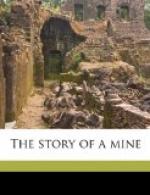that if it were not acceded to he would be compelled
to buy up various Mexican mines and flood the market
with quicksilver to the great detriment of the “Blue
Mass Company,” which thoughtful suggestion,
offered by a man frequently alluded to as one of “California’s
great mining princes,” and as one who had “done
much to develop the resources of the State,”
was not to be lightly considered; and so, after a
cautious non-consultation with the Company, and a
commendable secrecy, the stockholder sold out.
Whereat it was speedily spread abroad that the great
Capitalist had taken hold of “Blue Mass,”
and the stock went up, and the other stockholders rejoiced—until
the great Capitalist found that it was necessary to
put up expensive mills, to employ a high salaried
Superintendent, in fact, to develop the mine by the
spending of its earnings, so that the stock quoted
at 112 was finally saddled with an assessment of $50
per share. Another assessment of $50 to enable
the Superintendent to proceed to Russia and Spain and
examine into the workings of the quicksilver mines
there, and also a general commission to the gifted
and scientific Pillageman to examine into the various
component parts of quicksilver, and report if it could
not be manufactured from ordinary sand-stone by steam
or electricity, speedily brought the other stockholders
to their senses. It was at this time the good
fellow “Tom,” the serious-minded “Dick,”
and the speculative but fortunate “Harry,”
brokers of the Great Capitalist, found it convenient
to buy up, for the Great Capitalist aforesaid, the
various other shares at great sacrifice.
I fear that I have bored my readers in thus giving
the tiresome details of that ingenuous American pastime
which my countrymen dismiss in their epigrammatic
way as the “freezing-out process.”
And lest any reader should question the ethics of
the proceeding, I beg him to remember that one gentleman
accomplished in this art was always a sincere and direct
opponent of the late Mr. John Oakhurst, gambler.
But for once the Great Master of Avarice had not taken
into sufficient account the avarice of others, and
was suddenly and virtuously shocked to learn that
an application for a patent for certain lands, known
as the “Red-Rock Rancho,” was about to
be offered before the United States Land Commission.
This claim covered his mining property. But the
information came quietly and secretly, as all of the
Great Master’s information was obtained, and
he took the opportunity to sell out his clouded title
and his proprietorship to the only remaining member
of the original “Blue Mass Company,” a
young fellow of pith, before many-tongued rumor had
voiced the news far and wide. The blow was a
heavy one to the party left in possession. Saddled
by the enormous debts and expenses of the Great Capitalist,
with a credit now further injured by the defection
of this lucky magnate, who was admired for his skill
in anticipating a loss, and whose relinquishment of




